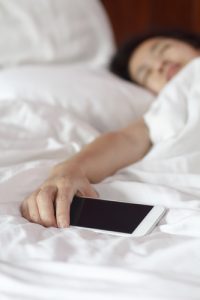 Do you have a cell phone? If you’re reading this in the year 2016, then the odds are that you do. And if you’re like most Americans, then you’re probably at least slightly addicted to your phone. Nobody can blame you for being obsessed with your device considering everything such a small and convenient object can do. Nevertheless, you might want to take a few steps away from your phone to save your health. More research is producing evidence that people who use their phones more, especially close to bedtime, get worse and less sleep, plus it could even lead to disease!
Do you have a cell phone? If you’re reading this in the year 2016, then the odds are that you do. And if you’re like most Americans, then you’re probably at least slightly addicted to your phone. Nobody can blame you for being obsessed with your device considering everything such a small and convenient object can do. Nevertheless, you might want to take a few steps away from your phone to save your health. More research is producing evidence that people who use their phones more, especially close to bedtime, get worse and less sleep, plus it could even lead to disease!
The Research
In one of the most recent studies on sleep and cell phone use, Dr. Gergory Marcus, comments on how poor sleep quality is not only connected to difficulty concentrating or being in a bad mood, but may also be a risk factor to multiple diseases. That’s why so many Americans having access to phones can be concerning if the new evidence continues to be verified.
In the study, 653 adults had an app on their phone that recorded screen time for 30 days. Each day they would record their length of sleep and sleep quality. On average, the researchers found that people used their phones for 3.7 minutes and as the usage time increased, the quality of sleep decreased.
The Results
So what do these results mean? The study doesn’t exactly prove that there is a direct relationship between extended screen time and poor sleep on its own. However, it does support other research that sights phone time as factor for difficulty sleeping. Thus, the results can be taken seriously, though there is room for extended research.
Why is your phone doing this? Data suggests that the blue light that your phone emits suppresses melatonin, which is a hormone the helps your body maintain its circadian rhythms. In addition, what is definitely known is that emotional upset or being stimulated can affect sleep quality. Meaning that going on Facebook, Instagram, or Twitter and watching a video of puppies or seeing pictures of a serious crisis could definitely affect the way you get to sleep.
What does this mean for you?
Even if the conclusion isn’t set in stone, you should still take these results seriously to prevent future issues and to get better sleep for a happier and healthier tomorrow. If you are already having problems falling asleep or are struggling to function the next morning, then seriously try setting aside the phone to see if that helps. Researchers suggest that you avoid your phone as much as an hour prior to sleeping. You have nothing to lose by letting your phone sit on its own. It will be working the next morning and you can go back to scrolling through Twitter or posting a selfie on Instagram.
Don’t underestimate the necessity of sleep, as it is vital to your physical and mental health. Without it, you could face some serious consequences as bad as high blood pressure or stroke. So text your friends “good night” an hour before you actually hit the hay. You will be making a positive difference for ev
